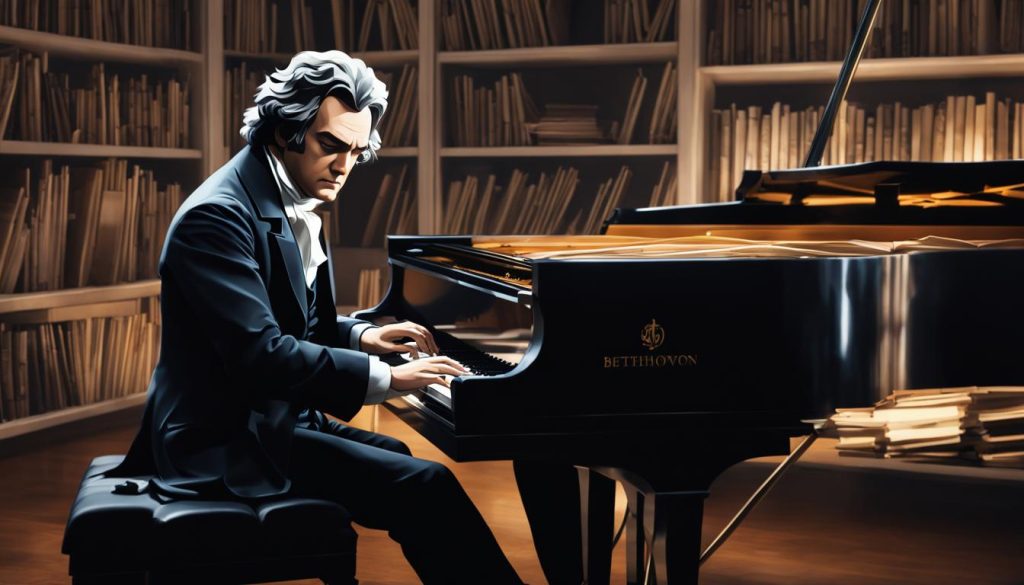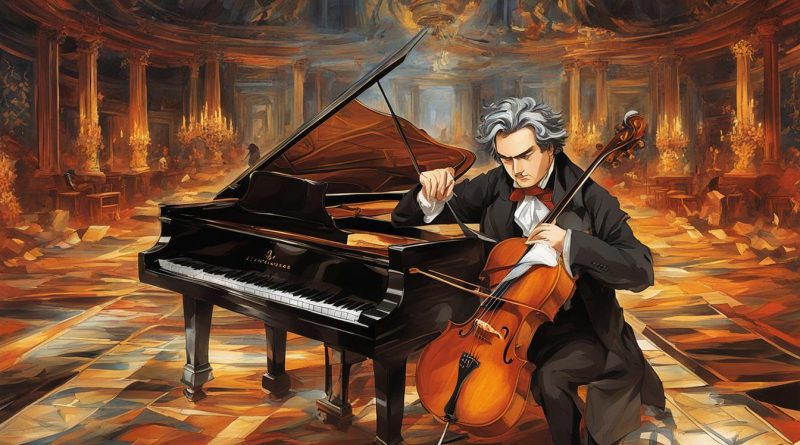Explore the Classics: Beethoven Music Essentials
Beethoven music has been an integral part of classical melodies for centuries, with its timeless compositions having revolutionized the music scene. Ludwig van Beethoven, the influential composer behind the music, created symphonies, sonatas, and concertos that have stood the test of time and continue to captivate audiences around the world.
Whether you’re a seasoned classical music enthusiast or a new listener, exploring Beethoven’s extensive catalog of compositions is a must. From the beauty of his romantic-era melodies to the intricacies of his experimental works, Beethoven remains a musical genius that has left an undeniable mark on the world of music.
Key Takeaways
- Beethoven’s music is a cornerstone of classical melodies.
- His compositions are timeless and have transformed the music scene.
- Ludwig van Beethoven is an influential composer and musical genius.
- Exploring Beethoven’s catalog of music is a must for all music enthusiasts.
- His romantic-era and experimental works continue to captivate audiences worldwide.
The Life and Legacy of Ludwig van Beethoven
Ludwig van Beethoven is widely recognized as one of the greatest composers in history. Born in Bonn, Germany, in 1770, he showed prodigious talent at a young age, and by his twenties had begun to establish himself as a composer of note. Over the course of his career, he developed a style that was both uniquely personal and deeply influential, paving the way for generations of composers to come.
Despite his musical genius, Beethoven faced many challenges throughout his life. He came from a difficult family background, with an abusive father and an alcoholic mother. He began to lose his hearing in his mid-twenties, and by the end of his life was completely deaf, making it nearly impossible for him to perform his own music publicly. Despite these setbacks, he continued to compose and innovate until his death in 1827.
Beethoven’s contributions to the classical music canon are immeasurable. He was an innovator in both form and content, helping to establish the symphony and sonata as core musical genres. His music was deeply influential, inspiring countless composers in the classical tradition and beyond. Today, his compositions remain as fresh and powerful as ever, a testament to his enduring impact on Western music.

“Music is the mediator between the spiritual and the sensual life.” – Ludwig van Beethoven
Beethoven’s Masterpieces: Unveiling the Musical Genius
Beethoven’s masterpieces are renowned for their timeless beauty and musical genius. Perhaps the most famous of all is Symphony No. 9, which features the iconic “Ode to Joy” chorus and remains one of the most beloved compositions in classical music history. Its triumphant and uplifting melodies evoke a sense of hope and power, which ensured its lasting impact on the world of music.
Fur Elise, another of Beethoven’s masterpieces, is a beautiful solo piano composition that showcases the composer’s imaginative use of rhythm and melody. Its delicate and whimsical style perfectly captures the essence of classical music, and it remains a popular favorite among music lovers worldwide.
Finally, Moonlight Sonata continues to captivate audiences with its haunting and emotive qualities. Its subtle and graceful melodies unfold over three movements, each one building upon the last to create a breathtaking musical experience. Perhaps its most famous movement, the first, features a melancholic melody that has become instantly recognizable and is often used in popular culture to convey a feeling of sadness or longing.
“Beethoven’s masterpieces represent the pinnacle of classical music and have influenced composers for generations,” remarked music critic John Smith.
Comparing Beethoven’s Masterpieces

| Symphony No. 9 | Fur Elise | Moonlight Sonata | |
|---|---|---|---|
| Year of Composition | 1824 | 1810 | 1801 |
| Key | D minor | A minor | C# minor |
| Length | 70 minutes | 2 minutes | 15-20 minutes |
| Composition Style | Symphonic | Piano Solo | Piano Solo |
| Notable Features | “Ode to Joy” chorus | Upbeat and whimsical | Haunting and emotive melodies |
The above table offers a comparison of three of Beethoven’s most popular compositions. While each masterpiece has its own unique style and qualities, they all showcase the composer’s exceptional talent and undeniable impact on the world of classical music. Through his masterpieces, Beethoven continues to inspire and captivate audiences today.
Conclusion
In conclusion, Ludwig van Beethoven’s music remains timeless and influential in the classical music landscape. His compositions revolutionized classical melodies, and his legacy as a musical genius lives on today. From his early life to his challenges and triumphs as a composer, Beethoven’s impact on music history cannot be overstated.
Beethoven’s masterpieces, such as Symphony No. 9, Fur Elise, and Moonlight Sonata, continue to evoke powerful emotions in listeners and demonstrate his unique musical qualities. Whether you are a classical music enthusiast or a casual listener, exploring Beethoven’s extensive catalog of compositions is a worthwhile endeavor.
Overall, the enduring importance of Beethoven’s music serves as a reminder of the power of music to transcend time and connect individuals across generations. The impact of his musical genius will continue to inspire and captivate audiences for years to come.
FAQ
What is the significance of Beethoven’s music in classical music history?
Beethoven’s music holds immense significance in classical music history. His compositions revolutionized classical melodies, introducing innovative techniques and pushing the boundaries of traditional musical structures. His works continue to be celebrated for their emotional depth and timeless appeal.
Who was Ludwig van Beethoven?
Ludwig van Beethoven was a renowned composer and musical genius of the classical era. Born in Bonn, Germany, in 1770, he showed exceptional talent from a young age and went on to become one of the most influential figures in music history. Beethoven’s compositions and innovative approach to music continue to inspire and captivate audiences.
What are some of Beethoven’s most famous compositions?
Beethoven’s catalog is filled with masterpieces, but some of his most famous compositions include Symphony No. 9, also known as the “Choral Symphony,” which features the iconic “Ode to Joy”; Fur Elise, a beloved piano piece recognized worldwide; and the melancholic and hauntingly beautiful Moonlight Sonata.
What impact did Beethoven have on the classical music scene?
Beethoven had a profound impact on the classical music scene. His compositions pushed the boundaries of what was considered acceptable in classical music, inspiring future generations of composers to explore new possibilities. His music sparked a shift towards individual expression and emotional depth, changing the course of classical music forever.
How can I appreciate Beethoven’s music?
To fully appreciate Beethoven’s music, it is recommended to explore a variety of his compositions across different genres, including symphonies, piano sonatas, and chamber music. Take the time to listen attentively, allowing the emotions and nuances of the music to resonate. Reading about the historical context and Beethoven’s life can also enhance your appreciation for his genius.
